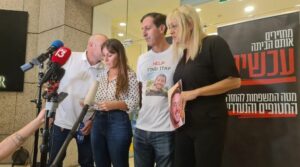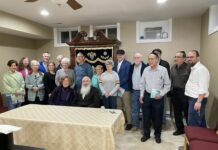
This past weekend, Ruby Chen was looking forward to celebrating his son Alon’s bar mitzvah together with the boy’s older brother, Itay, who was due to come home from his military service.
But on Oct. 13, instead of focusing solely on preparations for a family milestone, Chen joined a video call with President Joe Biden to talk about Itay, 19, who was stationed on the Gaza border and has been missing since Hamas’ invasion of Israel on Oct. 7.
Chen, an Israeli-American venture capitalist, joined relatives of 13 other Americans who have been missing since the invasion, in which Hamas terrorists killed 1,300 Israelis, wounded thousands and took more than 100 captive. Hundreds, in total, are missing.
Now, the family members of those missing Israelis have formed their own battalion of sorts, organizing via group text and, within days, getting the attention of the world and the president of the United States. Prime Minister Benjamin Netanyahu met with families of those missing for the first time on Sunday.
Starting in 2006, the activism of a single set of parents on behalf of their captured son — Israeli soldier Gilad Shalit — sparked a global movement. Today, there are hundreds of families following in their footsteps and inspiring action. A brigade of volunteers is papering walls across the globe with pictures of the missing. Their names and photos have spread across social media. And — with the help of press conferences and crisis PR reps — their relatives want to make sure their names are not forgotten as Israel prepares to ramp up its war against Hamas in Gaza.
“All of the families felt like they needed to unload,” Chen told Kan, Israel’s public broadcaster, regarding the meeting with Biden, which lasted an hour and a half. Chen said Biden referenced his own loss of family members and vowed to seek all the hostages.
Before Netanyahu’s Sunday meeting with families, Chen said in a comment translated from Hebrew, “If only the missing and captive got the same attention from the Israeli government. Where’s the prime minister of Israel? Why isn’t he talking to us?”
That effort is happening in parallel with an initiative led by the U.S.-based National Council of Jewish Women, which has enlisted an array of prominent women activists and celebrities — including Deborah Messing, Gal Gadot, Helen Mirren, Amy Schumer and more — to call in a letter for the release of all women and children held by Hamas, and for the provision of medical care to the hostages.
The group’s CEO, Sheila Katz, said that she personally knows six people believed to be taken hostage — a family of five and Vivian Silver, a prominent peace activist who moved to Israel from Canada.
“Innocent individuals ought not be used as bargaining chips for any cause or purpose,” reads the group’s letter, which garnered 5,000 signatures in its first 12 hours online. “The infants, children, mothers and elderly taken from their homes must be safely returned to their loved ones.”
The coalition of Israeli families has succeeded in getting the government’s attention, holding a meeting on Oct. 13 with Gal Hirsch, an Israeli general whom Netanyahu has put in charge of the hostage issue. But after the meeting, Mary Loubton, the sister of Tamar Goldenberg, who is missing, made clear that the families are still searching for answers.
“Have they been abducted, are they dead?” she said in a statement. “What happens to all the bodies that have yet to have been identified? Why don’t they get assistance from abroad for quick DNA identification? Why do we need to be in the dark with all this difficulty?”
The coalition has three demands: the immediate release of all hostages, the opening of a humanitarian corridor to provide them with medical care and the intervention of world leaders.
The effort to organize families of the missing began soon after the invasion started. Haim Rubinstein, a communications professional, saw news of the incursion and realized that the government, overwhelmed with repelling a surprise attack that caught it off guard, would not immediately respond to families looking for their loved ones.
“I understood that the state was not going to do anything,” said Rubinstein, who does not have a relative missing but has thrown himself into the effort. “It was in a state of shock on all fronts.”
That evening, he saw a TV interview with Moshe Or, whose brother Avinatan and Avinatan’s girlfriend, Noa Argamani, were captured by Hamas at a rave where the terrorists massacred 260 people. A clip of the couple being kidnapped has circulated widely online.
Rubinstein called Or and the two met the following morning. “I told Moshe, ‘Let’s pick up the baton,’ and we started work immediately.”
They began by starting a WhatsApp text messaging group with family members of the missing. By that night, relatives of 70 missing Israelis were in the group. By Oct. 12, the number had grown to 341, though it keeps changing. Every time the number drops, said Rubinstein, “It’s a bad sign. It means they’re dead.” Those family members then get moved to another WhatsApp group, for the bereaved.
“I haven’t cried for 20 years,” Rubinstein said. “I didn’t cry at my dad’s funeral. I always thought I didn’t know how to cry. This week I haven’t stopped crying.”
Before long, Rubinstein’s effort joined forces with two other initiatives to organize families of missing Israelis. One was led by Dudi Zalamanovitch, whose daughter survived the rave massacre but whose wife’s nephew is missing, and the other by Ronen Tzur, a former Labor party lawmaker who is now a communications professional. Tzur doesn’t have any relatives among the missing; an employee of his was searching for two cousins whose bodies were found on Oct. 13, Rubinstein said.
Now they’re united as the Hostages and Missing Families Forum, for which Rubinstein is the spokesperson and Tzur the director. Zalmanovitch donated office space to the group. The effort launched a fundraising drive on Oct. 12 that, on its first day, raised $500,000. It organized the meeting with Hirsch, the government official, which drew 500 relatives of missing Israelis.
And it has recruited hundreds of volunteers — from psychologists to social media professionals and alumni of the IDF spokesperson’s office who are gathering the stories of the hostages and missing and spreading them, and their photos, around the world.
That effort has reached the United States, where volunteers nationwide have been seen posting photos of the hostages, with their names, on walls and billboards across the country. Their photos — including those of small children and octogenarians, have also spread widely online along with a hashtag: #BringThemHomeNow.
The group has also grown to include families of U.S. citizens and other foreign nationals who are missing or were taken hostage, some of whom had been organizing independently until being invited into the broader effort.
“It’s chaos, but good chaos,” Ruby Chen said of the Tel Aviv office. “They have good people. Everybody has good intentions and is coming together. I think that’s part of the DNA of the Jewish people, especially of the Israeli people. At times like this, you put aside all of the political differences to come together in unity.”
The forum is also leveraging the expertise of Israelis who have helped with hostages previously captured by Hamas. It has enlisted David Meidan, a former Mossad officer who managed the negotiations over the release of Shalit. The Oct. 13 meeting included Simcha Goldin, father of Hadar Goldin, a fallen soldier whose body has been held by Hamas for nearly a decade.
“It’s unfortunate that the families needed to do this out of frustration with official channels,” Chen said. “I’m a big believer that we’ve suddenly become family.”







